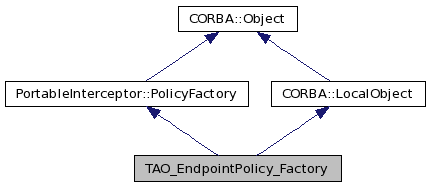Policy factory for the endpoint policies. More...
#include <EndpointPolicy_Factory.h>


Public Member Functions | |
| TAO_EndpointPolicy_Factory (TAO_ORB_Core *orb_core) | |
| virtual CORBA::Policy_ptr | create_policy (CORBA::PolicyType type, const CORBA::Any &value) |
Private Attributes | |
| TAO_ORB_Core * | orb_core_ |
| Cached pointer of our ORB_Core. | |
Policy factory for the endpoint policies.
Definition at line 41 of file EndpointPolicy_Factory.h.
| TAO_EndpointPolicy_Factory::TAO_EndpointPolicy_Factory | ( | TAO_ORB_Core * | orb_core | ) |
Definition at line 24 of file EndpointPolicy_Factory.cpp.
: orb_core_ (orb_core) { }
| CORBA::Policy_ptr TAO_EndpointPolicy_Factory::create_policy | ( | CORBA::PolicyType | type, | |
| const CORBA::Any & | value | |||
| ) | [virtual] |
Definition at line 31 of file EndpointPolicy_Factory.cpp.
{
if (type == EndpointPolicy::ENDPOINT_POLICY_TYPE)
{
const EndpointPolicy::EndpointList* endpoint_list = 0;
if (!(value >>= endpoint_list))
throw ::CORBA::PolicyError (CORBA::BAD_POLICY_VALUE);
TAO_Acceptor_Registry & registry =
this->orb_core_->lane_resources ().acceptor_registry ();
TAO_Acceptor ** const acceptors_begin = registry.begin ();
TAO_Acceptor ** const acceptors_end = registry.end ();
CORBA::ULong const num_eps = endpoint_list->length ();
// need to count the protocol types offered by the acceptors
// partially defaulted endpoint values are only acceptable if
// there are more than one protocol available to the ORB.
CORBA::ULong last_known_prot = 0xFFFFFFFF; // tag = 0 is IIOP
int prot_count = 0;
for (TAO_Acceptor** acceptor = acceptors_begin;
acceptor != acceptors_end;
++acceptor)
{
if ((*acceptor)->tag () != last_known_prot)
{
last_known_prot = (*acceptor)->tag ();
++prot_count;
}
}
// The endpoint list in the value is validated to ensure that
// at least one endpoint in the list matches an endpoint the
// ORB is listening on.
bool found_one = false;
for (CORBA::ULong idx = 0; !found_one && idx < num_eps; ++idx)
{
CORBA::ULong prot_tag = (*endpoint_list)[idx]->protocol_tag();
TAO_Endpoint_Value_Impl const * const evi =
dynamic_cast <TAO_Endpoint_Value_Impl const *> (
(*endpoint_list)[idx].in ());
if (!evi)
continue;
for (TAO_Acceptor** acceptor = acceptors_begin;
!found_one && acceptor != acceptors_end;
++acceptor)
{
if ((*acceptor)->tag () == prot_tag)
found_one = evi->validate_acceptor (*acceptor, prot_count > 1);
}
}
// There is no endpoint policy value matches an endpoint the ORB
// is listening on. A CORBA::PolicyError exception with a
// PolicyErrorCode of UNSUPPORTED_POLICY_VALUE is raised.
if (!found_one)
throw ::CORBA::PolicyError (CORBA::UNSUPPORTED_POLICY_VALUE);
TAO_EndpointPolicy_i *tmp = 0;
ACE_NEW_THROW_EX (tmp,
TAO_EndpointPolicy_i (*endpoint_list),
CORBA::NO_MEMORY (TAO::VMCID,
CORBA::COMPLETED_NO));
return tmp;
}
else
throw ::CORBA::PolicyError (CORBA::BAD_POLICY_TYPE);
}
Cached pointer of our ORB_Core.
Be aware that this pointer can be zero or not. In fact there are two ways to get this pointer filled:
Reimplemented from CORBA::Object.
Definition at line 53 of file EndpointPolicy_Factory.h.
 1.7.0
1.7.0